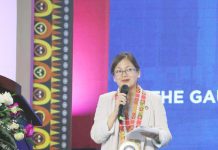TACLOBAN CITY – The Regional Development Council (RDC) has listed the Philippine Army as member of a committee tasked to monitor infrastructure projects in remote Eastern Visayas areas infested with communist rebels.
Acting on the request of Defense Secretary Delfin Lorenzana, the Regional Project Monitoring Committee (RPMC) approved the proposal to consider the military as one of the members of the body.
The RPMC, composed of officials from the government and private sector, admitted that several projects, especially in Samar provinces, have been delayed due to threats of the New People’s Army.
Consequently, incomplete projects have affected the delivery of basic service to poor families.
“Through the participation of the Armed Forces of the Philippines in RPMC meetings, delays in implementation of projects due to security-related reasons shall be appropriately addressed,” National Economic and Development Authority (NEDA) Regional Director Bonifacio Uy said, quoting Lorenzana’s letter.
Uy, chairperson of RDC’s monitoring arm, RPMC said the military will help check some ongoing projects and report their status in quarterly meetings.
Lt. Col. Gasanara Sultan, Army’s 8th Infantry Division assistant chief of staff for civil military operations, said they can tap all military units in the region to monitor ongoing construction activities, secure heavy equipment, and escort personnel of the Department of Public Works and Highways (DPWH) inspecting the project.
“Our efforts will be coordinated with DPWH because we need to know what kind of projects we have to prioritize in monitoring,” Sultan said.
At least 188 major projects in Eastern Visayas have been listed by the RPMC as priority for monitoring this year, citing their importance to the attainment of regional development goals and targets.
These projects include post-Yolanda reconstruction activities; resettlement sites in Tacloban City, Eastern Samar, Leyte, and Biliran; livelihood projects; irrigations; social infrastructure; agriculture and fishery; road and bridges; roads leading to tourism destinations; roads in conflict-stricken areas; seaports; and airports.
Uy said the project monitoring initiative by RDC members, both from government and private sector, will help ensure timely implementation of programs and projects critical to the attainment of goals in the 2017-2022 Regional Development Plan.
The official said programs and projects with substantial negative slippage and problems in implementation have been the priority for field monitoring and problem-solving sessions.
The RPMC is RDC’s project monitoring arm responsible for the monitoring and evaluation of priority programs and projects implemented in the region, particularly those that are encountering implementation bottlenecks and projects that are worthy for replication.
The body forwards monitoring reports and recommendations generated during the problem-solving sessions to the council for information and appropriate action. (SARWELL Q. MENIANO/PNA)



